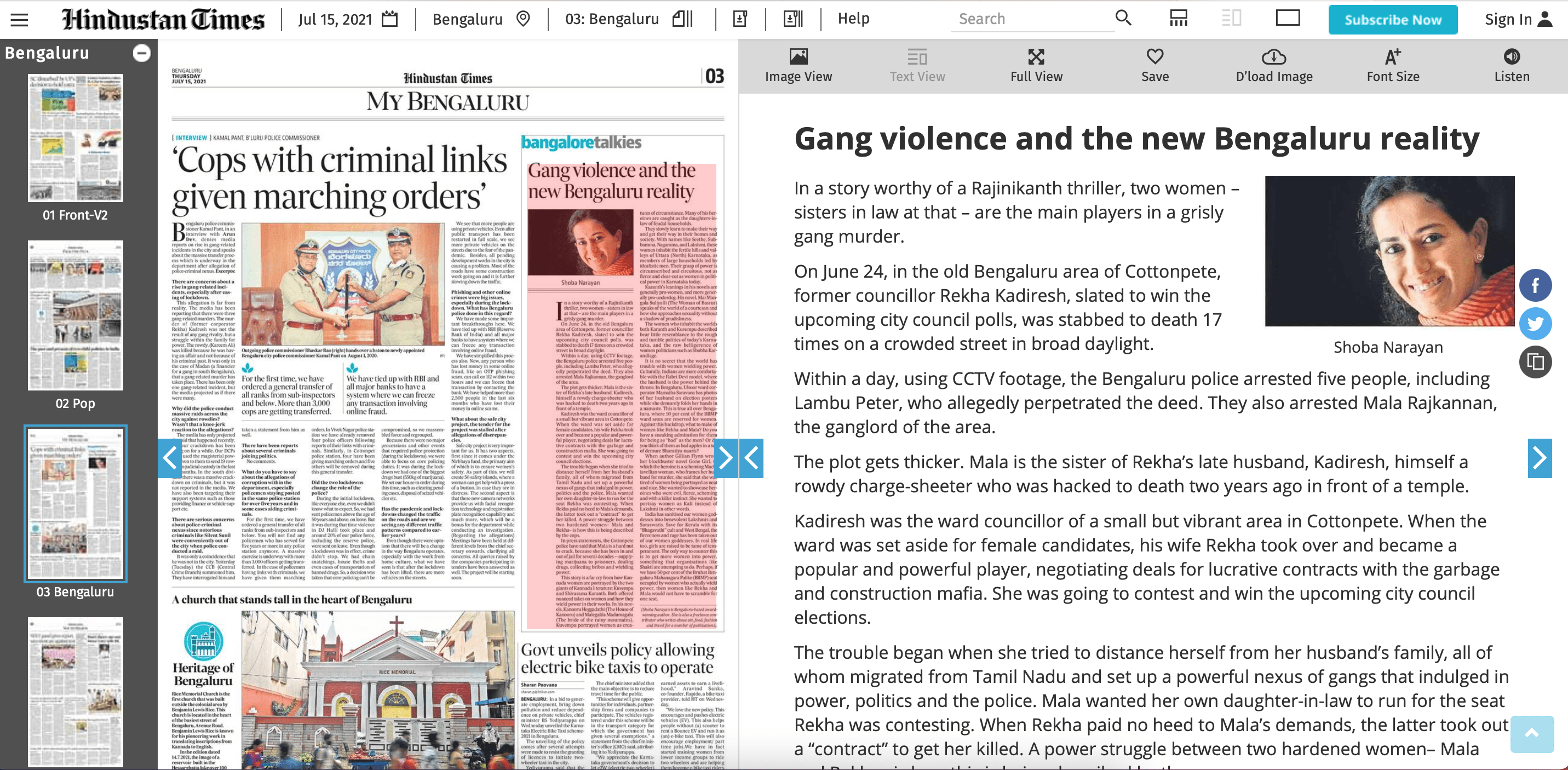Pitting two powerful women (relatives) against each other
In a story worthy of a Rajinikanth thriller, two women– sisters in law at that– are the main players in a grisly gang murder.
On June 24th, in the old Bengaluru area of Cottonpete, former councillor, Rekha Kadiresh, who was slated to win the upcoming city council polls was hacked to death 17 times on a crowded street in broad daylight. Within a day, using CCTV footage, the Bangalore police arrested 5 people including Lambu Peter, who allegedly perpetrated the deed. They also arrested Mala Rajkannan, the ganglord of the area.
The plot gets thicker. Mala is the sister of Rekha’s late husband, Kadiresh, himself a rowdy charge-sheeter who was hacked to death two years ago in front of a temple. Kadiresh was the ward councillor of a small but vibrant area in Cottonpete. When the ward was set aside for female candidates, his wife, Rekha took over and became a popular powerful player, negotiating deals for lucrative contracts with the garbage and construction mafia. She was going to contest and win the upcoming city council elections.
The trouble began when she tried to distance herself from her husband’s family, all of whom migrated from Tamilnadu and set up a powerful nexus of gangs that involved power, politics and the police. Mala wanted her own daughter-in-law to run for the seat that Rekha was contesting. When Rekha paid no heed to Mala’s demands, Mala took out a “contract” to get her killed. A power struggle between to hardened women– Mala and Rekha– is how this is being described by the cops.
In press statements, the Cottonpete police have said that Mala is a hard nut to crack, because she has been in and out of jail for several decades– supplying marijuana to prisoners, dealing drugs, collecting bribes and wielding power.
This story is a far cry from how Kannada women are portrayed by two giants of Kannada literature: Kuvempu and Shivarama Karanth. Both offered nuanced takes on women and how they wield power in their works. In his novels, Kanooru Heggadathi (The House of Kanooru) and Malegalila Madumagalu (The bride of the rainy mountains), Kuvempu portrays women as creatures of circumstance. Many of his heroines are caught as the daughters-in-law of feudal households. They slowly learn to make their way and get their way in their homes and society. With names like Seethe, Subbamma, Nagamma, and Lakshmi, these women inhabit the fertile hills and valleys of Uttara (North) Karnataka, as members of large households led by idealistic men. Their grasp of power is circumscribed and circuitous, not as fierce and clear-cut as women in political power in Karnataka today. Karanth’s leanings in his novels are generally pro-women and more generally pro-underdog. His novel, Mai Mangala Suhiyalli (The Woman of Basrur) speaks of the world of a courtesan and how she approaches sexuality without a shadow of prudishness. The women who inhabit the worlds that both Karanth and Kuvempu described bear little resemblance to the rough and tumble politics of today’s Karnataka and the raw belligerence of women politicians such as Shobha Karandlage.
It is no secret that the world has trouble with women wielding power. Culturally, Indians are more comfortable with the Rabri Devi model, where the husband is the power behind the throne. In Bangalore, Ulsoor ward corporator, Mamatha Saravana has photos of her husband on election posters while she demurely folds her hands in a namaste. This is true all over Bangalore, where 50 percent of the BBMP ward seats are reserved for women. Against this backdrop, what to make of women like Rekha and Mala? Do you have a sneaking admiration for them for being as “bad” as the men? Or do you think of them as bad apples in a sea of demure bharatiya-naaris?
When author Gillian Flynn wrote her blockbuster novel, Gone Girl in which the heroine is a scheming Machiavellian woman who frames her husband for murder, she said that she was tired of women being portrayed as neat and nice. She wanted to showcase heroines who were evil, fierce, scheming and with a killer instinct. She wanted to portray women as Kali instead of Lakshmi in other words.
India has sanitized our women goddesses into benevolent Lakshmis and Saraswatis. Save for Kerala with its “Bhagavathi” cult and West Bengal, the fierceness and rage has been taken out of our women goddesses. In real life too, girls are raised to be tame of temperament. The only way to counter this is to get more women into power, something that organizations like Shakti are attempting to do. Perhaps if we have 50 percent of the Bruhat Bengaluru Mahanagara Palike (BBMP) seat occupied by women who actually wield power, then women like Rekha and Mala would not have to scramble for one seat.




Leave A Comment